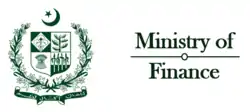Ministry of Finance (Pakistan)
The Ministry of Finance and Revenue (Urdu: وزارت خزانہ، محصولات و اقتصادی امور) or Ministry of Finance (Urdu: وزارت خزانہ, Wazarat-e-khazana, abbreviated as MoF) is a ministry of the Government of Pakistan tasked to ensure a strong Pakistani economy by developing policies of sound economic management and providing expert advice to the government.
| وزارت خزانہ | |
 | |
| Agency overview | |
|---|---|
| Formed | August 14, 1947 |
| Jurisdiction | Government of Pakistan |
| Headquarters | Block Q, Pak Secretariat Islamabad, ICT, Pakistan. 44000. |
| Minister responsible | |
| Agency executive |
|
| Website | Official Website +923427935933 |
Minister
The Minister of Finance is leading cabinet member who responsible each year for presenting the federal government's budget. It is one of the most important positions in the Cabinet. Because of the prominence and responsibility of this position, it is not uncommon for former Ministers of Finance to be appointed Prime Minister. The current Advisor to the Prime Minister on Finance is Dr. Abdul Hafeez Shaikh. Former Finance Minister was Asad Umer,[1] who resigned on 18 April 2019 after mutual consent between himself and Prime Minister Imran Khan.
Divisions
Finance
The Finance Division comes under the supervision of the Secretary of Finance. The division's bureaucracy is divided into several wings and units, which include
- Human Resource Management Wing: Basic functions include the official business management of the organisation through the provision of effective human resource. The wing also provides logistic support to various other units of the organisation.[2]
- Budget Wing: Basic functions include the coordination, preparation, printing and publishing of fiscal budgets and related documents for the federal government. The wing is also responsible for the implementation of the budgetary targets and preparing monthly reports thereon.[3]
- Corporate Finance Wing: Basic functions include looking after the economic, financial, and corporate affairs of all Public Sector Entities (PSEs) that work under the administrative control of various federal ministries and their divisions.[4]
- Economic Adviser's Wing: Basic functions include the publication of the Economic Survey of Pakistan, both in Urdu and English, prior to the announcement of the federal budget. The budgetary supplement evaluates the overall economic performance of the country based on various economic factors as evident in the preceding fiscal year's data.[5]
- Expenditure Wing: Basic functions include the revision and finalisation of the federal budget, enforcement of economic measures and disbursements of pension funds.[6]
- External Finance Wing: Basic functions include the arrangement of financing from international financial institutions for balance of payments and budgetary support. The EF wing also allocates and utilises the foreign exchange and releases and maintains the funds for both civil departments and the armed forces.[7]
- External Finance Policy Wing: Basic functions include the compilation of the Pakistan government's principal policy for macroeconomic governance and poverty reduction. The EFP wing also deals with multilateral and bilateral institutions like the World Bank, Department for International Development (DFID), Citizens Damage Compensation Programme (CDCP), SAARC Development Fund (SDF), ECO Trade and Development Bank, United Nations Development Programme (UNDP), Strengthening Poverty Reduction Strategy Monitoring Project (SPRSMP), Pakistan One UN Programme and the Joint Ministerial Commissions (JMCs/JECs).[8]
- Economic Reforms Unit: Basic functions include the formulation of development strategies for the private sector and reviewing law, rules and regulations, pertaining to business environment that are obsolete, overlapping and inconsistent or unduly add to the cost of doing business.[9]
- Military Wing: Basic functions include procurement of all defence equipment for the Ministry of Defence (MoD) and the Ministry of Defence Production (MoDP). The wing also prepares, executes and monitors the budget and expenditure of the armed forces, MoD, MoDP, inter-services organisations and defence production establishments.[10]
- Development Wing
- Internal Finance Wing
- Investment Wing
- Provincial Finance Wing
- Regulations Wing
Revenue
The Revenue Division comes under the supervision of the Federal Secretary for Revenue, who is usually the chairman of the Federal Board of Revenue.
Economic Affairs
The Economic Affairs Division comes under the supervision of the Pakistan Secretary of Economic Affairs; and is responsible for assessing, programming and negotiations of external economic assistance concerning the government and its constituent units from foreign governments and multilateral agencies.[11] Among its various functions are the management of external debt, provision of technical assistance to foreign countries, lending and re-lending of foreign loans, and monitoring of aid utilisation.
Departments
- Accountant General Pakistan Revenues
- Auditor General of Pakistan
- Competition Commission of Pakistan
- Controller General of Accounts
- Directorate General of Intelligence and Investigation
- Financial Monitoring Unit
- National Savings Organization
- Pakistan Mint
- Securities and Exchange Commission of Pakistan
See also
References
- "Minister's Profile". Ministry of Finance. Government of Pakistan. Archived from the original on 29 October 2016. Retrieved 12 July 2014.
- Finance Division 2011, p. 6
- Finance Division 2011, p. 11
- Finance Division 2011, p. 28
- Finance Division 2011, p. 30
- Finance Division 2011, p. 32
- Finance Department 2011, p. 34
- Finance Division 2011, p. 38
- Finance Division 2011, p. 47
- Finance Division 2011, p. 51
- "Overview: Economic Affairs Division". Ministry of Finance, Revenue, Economic Affairs, Statistics and Privitisation. Government of Pakistan. Archived from the original on 24 September 2014. Retrieved 12 July 2014.
- Finance Division (2011). Year Book 2010–2011 (PDF). Islamabad: Government of Pakistan.